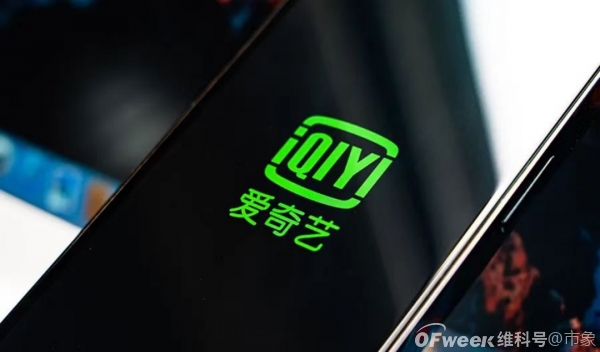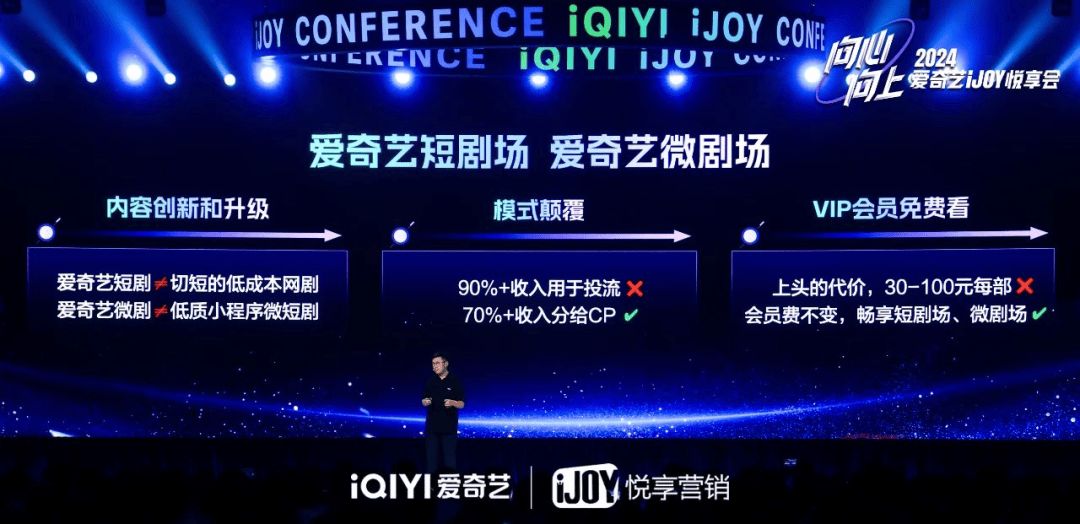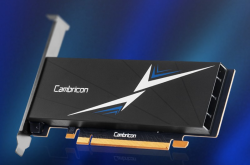"Help!" short series on iQIYI
![]() 09/28 2024
09/28 2024
![]() 576
576

iQIYI, which has been hovering at the door of micro-short series, couldn't resist opening that "Pandora's Box" any longer.
On September 25th, at iQIYI's Enjoyment Conference, over 300 new titles for 2025 were unveiled, but the response from both inside and outside the industry was not as enthusiastic as in previous years. The content market can be capricious; crowds can disperse suddenly, and those that once arrived at an accelerated pace are now leaving even faster.
However, for the micro-short series industry, the bombshell dropped by founder Gong Yu – iQIYI's direct entry into the heartland of micro-short series – was enough to shake things up. "iQIYI isn't the first to do this. One reason is that historically, we haven't had a clear answer to the question, 'What does iQIYI's micro-short series equal to?' Now we have a clearer idea."
Instead of digging deeper into the existing market, it's better to explore new incremental markets. For the past six consecutive quarters, iQIYI's subscription revenue has been declining, falling from 5.5 billion in Q1 2023 to 4.5 billion in Q2 2024. The number of subscribers has also dropped from a peak of 128 million to an estimated 93 million (without official disclosure of the exact figure). In contrast, Tencent's subscriber base has remained stable, growing slightly from 116 million in Q1 to 117 million in Q2. Meanwhile, Mango TV has also maintained growth, with subscription revenue of 1.96 billion, 2.35 billion, and 2.49 billion in the first half of 2023, the second half of 2023, and the first half of 2024, respectively.
Now that iQIYI is aggressively entering the short series market, it's bound to stir up significant ripples. Some remain pessimistic, believing that iQIYI has arrived too late, while others remain optimistic, seeing new players as new opportunities.
In response to iQIYI's entry into the market, leading short series producer Tinghua Island expressed optimism. "iQIYI is a platform that respects content deeply. We anticipate long-term cooperation with iQIYI in the field of short series," Tinghua Island told "Market Insight." In particular, they expressed interest in iQIYI's new business model, saying, "Short series need to explore diversified business models, and we want to try more."
Does iQIYI, which arrived early but was late to the party, still have a chance? Opinions vary widely. Fate seems to have taken a full circle here. Once upon a time, iQIYI was the one holding the steering wheel, but now, people are watching as this giant ship stumbles towards the river of micro-short series.
01 iQIYI's Ambitions
iQIYI's bombshell in the micro-short series sector essentially sent two main signals. Firstly, it proposed allocating "more than 70% of revenue to content producers" in terms of commercialization. Secondly, it offered "completely free access for members, without additional per-view charges."
For the current micro-short series market, this is undoubtedly a brand-new approach.
The micro-short series industry has been evolving rapidly, but in terms of business models, horizontal short series rely heavily on revenue sharing, while vertical short series primarily utilize in-app purchases (IAP) and in-app advertising (IAA). If the business model of horizontal short series still bears the shadow of traditional film and television, vertical short series have already embraced a new paradigm. IAA allows users to watch micro-short series for free, with producers monetizing through advertisements. IAP, on the other hand, requires users to pay to watch the series, but 80% of these payments are used for platform promotion, leaving only a fraction for producers.
This year, a new native model emerged for vertical short series, where short series accounts are directly created on platforms like Douyin and Kuaishou, allowing users to pay to watch short series directly. Apart from a small service fee paid to platforms like Douyin, producers can keep the rest of the revenue. To a large extent, its popularity stems from the significant income it generates for producers.
iQIYI's generous offer is bound to shake up the business model of micro-short series once again. However, for iQIYI, which has been late to the game for many years, this is a necessary sacrifice as it ventures into new territories.
In terms of content, iQIYI primarily launched two theaters: "Micro Theater" and "Short Theater." "Micro Theater" plans to release two new works weekly, focusing on male and female audiences and silver-haired demographics, with 1-5-minute vertical content. "Short Theater" plans to launch a new work weekly, covering genres such as ancient romance, modern romance, suspense, etc., with episode lengths ranging from 5 to 20 minutes and primarily featuring horizontal content.
iQIYI's intentions are clear: it wants a piece of every existing short series model in the market.
This is also the first time iQIYI has sent such a clear signal regarding micro-short series. Prior to this, iQIYI's attempts in the micro-short series market were mostly tentative, with the exception of the pioneering vertical short series "Life Is Messing with Me" in 2018. Subsequent attempts largely followed the common model adopted by various platforms, where users could watch the first few episodes for free but had to choose between watching ads or paying to view the full series.
This time around, whether it's in terms of business models or content, iQIYI's layout in micro-short series has a palpable sense of urgency.
To a large extent, this urgency is inseparable from iQIYI's current struggles. Throughout the first three quarters of this year, it's difficult to say that iQIYI has truly achieved a satisfying commercial victory. This is evident in its financial reports. iQIYI's second-quarter financial report showed total revenue of 7.4 billion yuan, a year-on-year decline of 5%. Net profit attributable to iQIYI was 68.7 million yuan, compared to 365.2 million yuan in the same period in 2023. Revenue from membership services was 4.5 billion yuan, a year-on-year decline of 9%. Revenue from online advertising services was 1.5 billion yuan, a year-on-year decline of 2%.
As iQIYI's core business accounting for a significant portion of its revenue, the decline in membership service revenue has significantly dragged down the company's total revenue and profits. This decline points to a very specific frustration – iQIYI is struggling to pinpoint the next hit.
At this year's Network Audio-Visual Conference, Senior Vice President of iQIYI, Dai Ying, bluntly summed up the performance of dramas in the first half of the year: there was a significant deviation between expected hits and actual results. "This represents an iteration in our audience's aesthetics that has far outpaced the speed of our content creators and the production of our content itself," she said.
Meanwhile, judging from the 2025 slate unveiled at iQIYI's Enjoyment Conference, the market is not overly confident. Even in the realm of romance dramas, which have traditionally been a sure bet, the buzz generated by the many upcoming titles featuring popular actors and big IPs has been muted, failing to ignite widespread interest.
The anxiety of innovation looms large, and after losing momentum, iQIYI has no choice but to be more decisive.
But does the micro-short series market still have room for iQIYI's ambitions?
02 The Micro-Short Series War: Each Player Pulls Out All the Stops
As iQIYI eyes the micro-short series industry, Hunan TV's "730 Damang Theater" announced that it would launch six micro-short series during the National Day holiday, premiering one episode each night.
Compared to the days when online dramas invaded satellite TV, it's no longer surprising to see micro-short series making inroads onto traditional television platforms. After all, today's micro-short series market seems to have been carved up in every conceivable niche.
Paid, free, youth, seniors, single dramas, theaters, websites, satellite TV, domestic, overseas… The process of trial and error, coupled with brutal competition, is a necessary path for almost every industry in its early stages. But the road for micro-short series is like a treadmill, traversing decades of exploration in just a few short years. It's not an exaggeration to say that the current state of micro-short series bears a striking resemblance to Hong Kong films of the 1990s, which were famously described by The New York Times as "all too excessive, all too mad."
Even AI has set its sights on micro-short series. Last month, Kunlun Tech released SkyReels, an AI short series generation platform. Going further back, Meitu released MOKI specifically for AI short film production in late July. CreativeFitting secured millions of dollars in Pre-A funding, and the world's first AI short series app, "Reel.AI," debuted overseas in July of this year. Earlier, Kuaishou had already launched "Miracle of Mountains and Seas: Breaking Waves," China's first AIGC original fantasy micro-short series directed by renowned director Chen Kun.
While AI's current capabilities are still somewhat unstable, and many practitioners view it more as a tool, there's no denying the immense potential of AI short series. Once the technology matures, short series have the opportunity to become content products with greater user-generated content (UGC) participation, where anyone can become a short series creator.
The waters are boiling, and everyone is in motion. iQIYI's long-form video rivals have already revealed their strategies. Youku has upgraded its IP-focused "Fuyao Plan" to a one-stop solution encompassing people, products, and markets, leveraging Alibaba's vast ecosystem including Alipay, Taobao, Fliggy, UC Browser, and Quark to boost the "micro-short series+" initiative.
Tencent Video's "Ten-Minute Theater" leverages a series of transparent and fair revenue-sharing policies to create more top-performing revenue-sharing dramas and establish a benchmark.
Multiple micro-short series from Mango TV have already aired on Hunan TV, with the dual-platform approach helping micro-short series gain faster traction among mainstream audiences and conquer television viewers sooner. Notably, in the first half of this year, Mango TV began exploring the production of vertical short series and launched three original vertical short series in July: "Spring Breeze Brings You to Me," "Pretending to Be in Love," and "My Three Brothers and Me."
Not to mention, in the "free domain" that iQIYI aims to conquer, there are already established players like Douyin's Hongguo Short Series and Pinduoduo Short Series. Compared to iQIYI, Hongguo Short Series has even taken a more resolute approach to free content. According to industry insiders, the Hongguo Short Series app is prepared to forgo profits for five years.
By leveraging this strategy, Hongguo has carved out a niche in the micro-short series market. Media reports suggest that Hongguo Short Series' daily active users (DAU) have surpassed 30 million, with total revenue from a single copyright exceeding 100 million yuan in July alone. The company has set a goal of reaching 100 million DAU next year.
Interestingly, even before the main battle has begun, skirmishes have already erupted on the sidelines. As early as November last year, iQIYI partnered with Douyin's subsidiary Fanxiaoshuo to explore new IP territories. This year, its flagship IP "I Learn to Kill Gods in a Mental Hospital" has already made its way onto iQIYI's 2025 slate.
Meanwhile, Douyin Short Series announced its collaboration with Mystery novelist Zi Jinchen to launch "Midnight Theater," featuring premium suspense micro-short series. The first work, "Sunrise," is a derivative micro-short series based on the original novel "Bad Kids" from the hit iQIYI series "Hidden Corner."
This "swap" between Douyin and iQIYI, to some extent, sends a new signal: purchasing top-tier copyrights for long-form content has become increasingly difficult, forcing players to seek new upstream channels. Short videos have seamlessly penetrated the heartland of long-form content, transforming long-form IPs into short series.
03 Can iQIYI Still Swing the Battle?
While the outside world remains somewhat ambivalent about iQIYI's move into micro-short series, what do industry insiders think?
As the producer of this year's biggest micro-short series black horse, "Flash Marriage to a Rich Husband," Tinghua Island is not averse to experimenting with multiple platforms. They expressed interest in iQIYI's olive branch, largely due to the favorable conditions offered to producers.
In the eyes of the public, even though the world of micro-short series is full of ups and downs, those within it always ride the wave, leveraging small advantages to achieve big wins, effortlessly managing their own niches.
However, like all industries, the Matthew Effect is evident in micro-short series. In the past two years, it has become increasingly difficult to hear about mid-tier creators striking it rich overnight. Instead, there are more stories of disappointment and financial losses lingering in social media circles. Even for a hit like "Flash Marriage to a Rich Husband," Tinghua Island revealed that the total revenue is expected to be around 6 million yuan.
Of course, there are breathtaking myths of hundreds of millions of yuan in revenue in this industry. For example, "Mr. Li, You've Got the Wrong Wife," another hit produced by Tinghua Island and focused on young people with a strong drama element, generated a revenue stream of 120 million yuan, ranking first among short series revenue in 2024.
However, in reality, under the traditional IAP model, producers can only receive a small fraction of this revenue, with 5% to 7% going to them and 80% of payments used for platform promotion. After deducting costs and other factors, the actual revenue is in the millions of yuan.
Now, with iQIYI generously ceding over 70% of revenue to producers, especially in the context of vertical short series where native, IAA, and IAP models coexist, this tangible certainty is hard to resist.

Therefore, from Tinghua Island's perspective, iQIYI's exploration of this new business model is bound to attract a large number of producers. On the other hand, they don't believe that this new business model will significantly impact the current industry, as "the industry itself is already in a state of coexistence between paid and free content."
In particular, both models have established their own playbooks, and based on different business models, there are clear differentiations in terms of costs, genres, content, and core competitiveness. For example, IAA short series typically have production costs ranging from 200,000 to 800,000 yuan, with diverse genres aimed at monetizing through advertisements and increasing platform daily active users. IAP short series have production costs of 200,000 to 500,000 yuan and currently focus primarily on private domains, as their target audience is mostly male, leading to mainstream genres such as comebacks, thrilling plots, and borderline content.
It's worth noting that the diversity of business models also allows micro-short series to adopt different monetization strategies at different stages of their lifecycle. The most common distribution method is to start with paid content and then transition to free content.
In this light, it's iQIYI that needs outstanding micro-short series creators to catch up. But for leading producers like Tinghua Island, iQIYI is not the only option.






